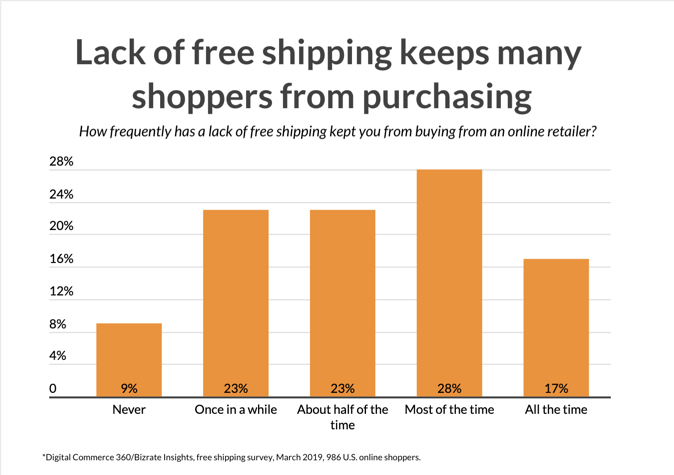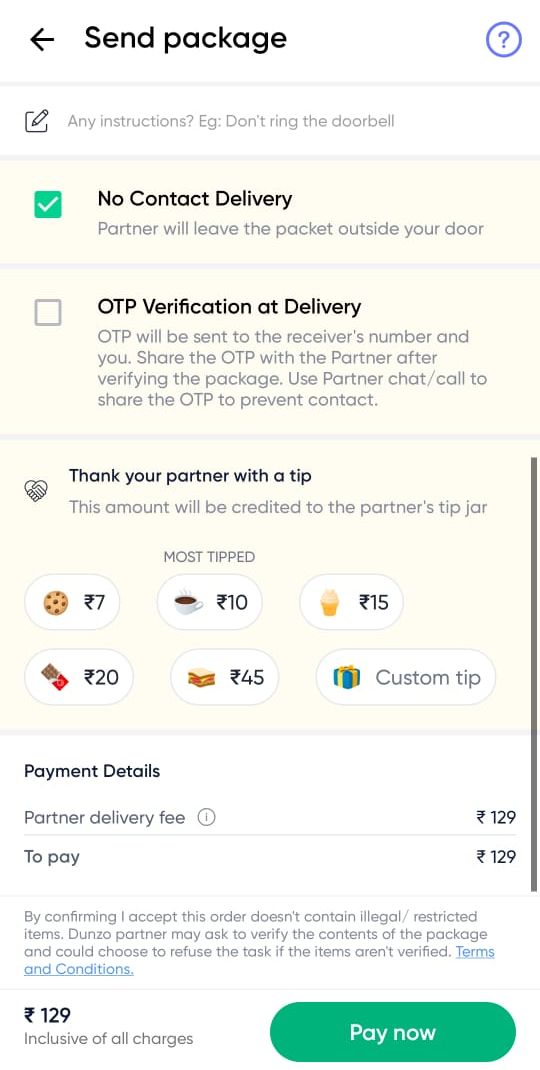Shipping is a unique challenge in ecommerce, and even more so in developing regions. Finding a shipping partner can be an arduous process, fraught with potentially irate customers. In this blog, we're going to discuss a few challenges merchants might face on the ground, as well as some possible solutions.
The era of online shopping
Online shopping has been growing steadily for some time, but 2020 accelerated the adoption across buyer segments and geographies. Every merchant not selling online felt the need to do so at the earliest. Not only was online shopping deemed safer than visiting retail stores, but many consumers also experienced the convenience of shopping online for the first time in their lives.

Data shows that 68% of shoppers don't complete an order because they are charged for shipping. This is another reason for merchants to find the cheapest and safest means of shipping. Only with this minimum pricing will they be able to offer free shipping to their customers.
Given this background, if you're planning to start selling online, you should consider the opportunities that shipping operations offer, the issues you might need to deal with, and possible solutions.
Ecommerce is growing
The numbers and facts just prove the same over and over. This data will help us understand why the game is shifting online.
The retail industry has been growing steadily at nearly 12% in India over the past few years. Compared to this, ecommerce has seen a much higher rate of growth at nearly 30% for the same period of time. Moreover, the pandemic happened. This trend is only accelerating, so there cannot be a better time to take your business online. Also, the ecommerce version of the aggregator model of business has now taken over the industry creating a social revolution where you don't need a physical presence anymore.
Factors such as demonetization (the Reserve Bank of India demonetized 86% of the Indian currency by value in circulation in 2016) and the subsequent growth of the digital payments industry, combined with the worldwide health crisis of 2020, has firmly established ecommerce in India and nearly guaranteed the industry's growth for years to come.
Challenges affecting the logistics industry
Merchants require abundant trust in a logistics company for them to feel secure enough to send their products. Damage or loss of products in transit means losses to the manufacturer. Some factors that have to be considered before deciding the logistics company are:
Safety: The safety of goods shipped is of prime importance for ecommerce businesses. Breakage, pilferage, items lost in transit, and delivery errors are common issues you might face if you happen to use unreliable logistics companies.
Coverage: Being able to deliver in a wide market is a competitive advantage. It is challenging to acquire a new customer, but losing them to an avoidable reason such as 'out of coverage area for your shipping company' is bad for business. The world is moving towards integrated hyper-local and international delivery being handled by the same organization.
Price: Price is the deciding factor now that there are several competitors in the logistics department. Giving your customers a flexible option of payment by weight or payment per package or even a flat rate for bulk transportation are some of the common trends.
Aggregators like Shiplite and Shiprocket in India are all successful because they give customers the option to choose a shipping carrier that provides feasible and affordable shipping based on the requirements of the sellers
Feedback: There is little opportunity for an ecommerce business to gather feedback about the shipping experience at the time of delivery. However, this is a challenge that needs to be resolved if the shipping performance is to improve over time.
Insurance: Having mandatory insurance services for packages containing expensive products will help sellers prevent losses even if a product has been damaged or lost in transit. Ensure that you use logistic companies with insurance policies if you deal with expensive products.
How to mitigate shipping challenges
The products getting delivered safely is the result required by both the merchants and the logistics company. Without proper delivery, both these companies will not be able to make a profit in their business. In order to avoid such mishaps from happening, we have some tips to mitigate these shipping challenges:
Safety
There are several ways to mitigate the risks in handing over goods to a shipping company:
OTP-based deliveries: This ensures that the packages are delivered to the right person, and it also acts as delivery confirmation.
Pay special care to packaging because preventing damage is better than dealing with losses in a business. Iterate for the best solution—optimize for the cost of packaging and the possibility of breakage.
Live tracking is now available with most shipping carriers. Ensure to use these facilities to help your customers track their packages.
Label fragile items appropriately. Most shipping carriers don't allow transporting of glass and fragile products. Even if they do, it will not be attached with insurance. This means that it is the responsibility of the seller to package the fragile items carefully enough.
Shipping insurance protects you against lost, stolen, or damaged packages. It incurs an additional charge which will depend on the price of the product being shipped. It's worth it when you actually have a lost or stolen package.

This is a screenshot from Dunzo. Shipping solutions now provide us with OTP verification at delivery, no contact delivery, and live shipping rates. These features in all now
Expand your horizons
In order to increase your business coverage area continuously, partner with local shipping carriers if needed. Check if the carriers you work with have collaborations with international logistics companies so that it will help you attain international markets.
Stay connected
Automate your shipping workflow as much as possible. Technology keeps your team, service providers, and customers always connected and on the same page. This is important for customer experience and to ensure that the time and effort needed for support doesn't stop you from scaling your business. Keeping your customers posted and being able to provide tracking promptly and buyer information is an important part of a great customer experience.
Be price-sensitive
If you are to succeed in the long term, a better shipping contract with preferential pricing and better service will be an important step for you. This will improve your profit margin and give you the assurance you need to give the best possible customer experience.
Shipping solutions should give you different carrier options based on the price, delivery time, and weight of the parcel.
Have backup
Always be prepared to face a surge in demand or issues with the shipping provider by having a shipping backup in place when needed.
Ask your customer
Constantly collect buyer feedback for your ecommerce store in general as well as for the delivery experience. This information will be priceless in implementing long-term plans for growth and improving business performance. Providing customer support and response is a 24x7 enterprise, so you should aim to achieve this for your business.
Delivery re-attempts
Ecommerce industry experts recommend attempting delivery at least three times. You should negotiate this practice with your shipping partner to provide a better customer experience.
Along with the above, here are a few industry-recommended methods to deliver customer delight with your shipping operations:
When moving to free shipping, experiment with limited-time free shipping first. If the response from customers improves, this is a clear indication to move to free shipping for your store.
You can also experiment with free shipping on orders that meet a price threshold. You will probably increase the average cart value for your store and considerably improve your profit margins.
When you launch new products, introduce free shipping for them. What's more, your customers will probably add this product to their cart just to get free shipping!
Just as with new products, when you decide to expand to new regions, you can introduce limited-time free shipping offers to induce potential customers to buy from you.
A word of caution
While offers are an ecommerce mainstay, use them wisely. If your margins don't allow for a particular offer, skip it. Perhaps even re-think the margins you are operating at.
Similarly, prioritize your orders based on your judgment. If you feel a particular customer or order deserves to be upgraded to overnight or one-day shipping, don't hesitate to extend the upgrade to them. Customer loyalty and delight are earned slowly and with gestures that surprise the customer.
If you are looking for more information about current shipping challenges, tune in to our detailed webinar on 'Shipping challenges and solutions for online sellers in India. Read more about the Shiprocket integration for Zoho Commerce.
For support queries, please reach out to us at support@zohocommerce.com.
Shiprocket is a tech-enabled logistics platform that connects merchants, customers, and supply chain partners. They deliver to over 26,000+ pin codes in India and over 220 countries globally in partnership with 17 courier service providers such as ekart, Ecom Express, and Delhivery, among others. We thank Shiprocket and Mr. Vishesh Khurana for their insight.
Commerce Insights is a blog maintained by Zoho Commerce for ecommerce merchants. We discuss topics relating to product features, getting started with ecommerce, and marketing ideas for businesses.
We want you to be a part of this journey in building an ecommerce community. Please send us your thoughts, suggestions, and ideas at marketing@zohocommerce.com.
If you wish to publish an article on the platform, please send it to the same email.
For support-related queries, please write to support@zohocommerce.com.